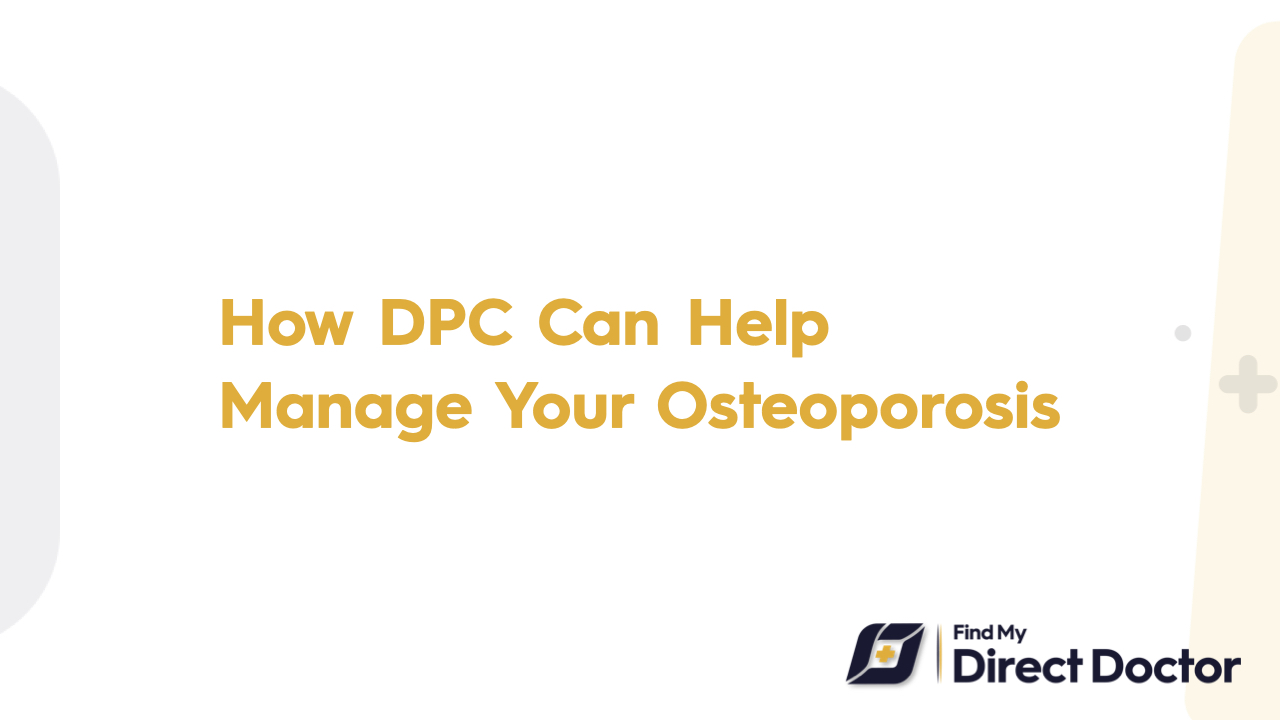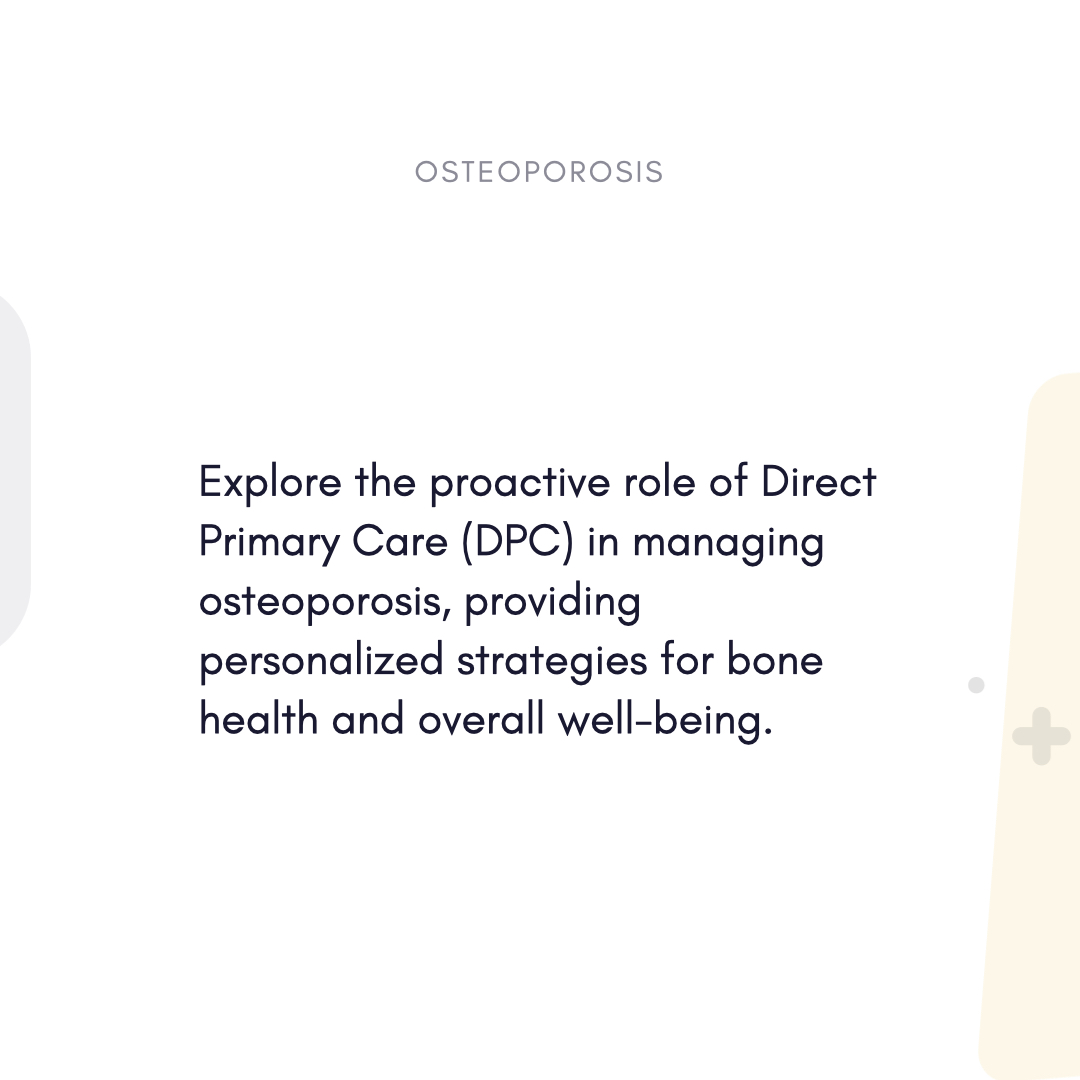Osteoporosis and Direct Primary Care (DPC): Strengthening Bones, Empowering Lives
One sneeze that breaks a rib. An accident that breaks a hip. For ten million Americans suffering with osteoporosis, fragile bones make daily activities highly dangerous. Conventional treatment sometimes responds to fractures rather than preventing them, so trapping patients in a cycle of anxiety. Direct Primary Care (DPC) offers proactive, patient-centered solutions to restore bone strength and recover independence, though.

Recognising Osteoporosis
Osteoporosis weakens bones, rendering them porous and brittle and likely to break. Important triggers are aging, hormonal changes (such as menopause), and nutrient deficits. Silent until a break starts, its warning indicators consist in:
- Stooped posture or loss of height
- Back trouble resulting from spinal compression fractures
Risk aspects:
- Family past, low BMI, smoking, or long-term steroid use
Long-term effects of untreated osteoporosis:
- Deforming hip, spine, or wrist fractures
- Reduced mobility and persistent agony
- Loss of life's quality and freedom
Early, aggressive intervention can prevent fractures and reverse bone loss, the Bone Health and Osteoporosis Foundation (BHOF) emphasizes.
DPC Changing Behavior Control of Osteoporosis
Operating on a membership model usually 50–150 USD/month, Direct Primary Care (DPC) provides unlimited access to your physician for a set fee. For those with osteoporosis, this translates into no hurried visits, no surprise bills, and a care plan as strong as your bones demand.
1. Preventive Strategies Active and Precision Screening
DPC gives early action top priority using:
- Frequent DXA readings: Reasonably priced bone density tests tracked across time.
- Determining your 10-year fracture risk will help you to guide the urgency of treatment.
- Examining vitamin D, calcium, and parathetic hormone levels helps one to balance things out.
2. Individualized, Evidence-Based Approach
- Medication strategies include bisphosphonates (e.g., alendronate), denosumab injections, or anabolic agents like teriparatide for severe cases, following BHOF guidelines.
- Customized weight-bearing exercise plans (such as tai chi, resistance training), smoking cessation programs, and fall-prevention home assessments) as well as smoking cessation programs
- Meal plans heavy in calcium, vitamin D optimization, and magnesium supplementation provide nutritional support.
- Your doctor covers not only bone density but also sleep quality, mental health, and obstacles to staying active—key drivers of skeletal health—during 30 to 60 minute visits.
3. Reasonably Priceless, Open Treatment
- Through wholesale-priced labs and imaging—e.g., DEXA scans at 50% less than insurance rates—DPC cuts costs.
- Preventive attention to avoid expensive fractures, surgeries, or rehabilitative stays.
- Your membership covers all hidden costs including follow-up visits and medication changes.
Personal Success Stories from Real Life
- Case 1: Before coming to DPC, Susan, 68, had two spinal fractures. Her doctor wrote a denosumab prescription along with a vitamin D regimen and balance training. Her DXA scan eighteen months later revealed a 9% increase in hip bone density along with zero additional fractures.
- Case 2: Raj, 72, steered clear of osteoporosis medications out of worry about jaw necrosis. His DPC clinic created a non-pharmacologic regimen including calcium citrate, vibration therapy, and a referral to a discounted fall-prevention class. Now he's playing with grandchildren worry-free and gardening.
Frequencies of Questions: DPC and Osteoporosis
- Q: Can DPC manage difficult situations calling for experts?
- A: Yes. Often arranging cash-pay discounts for consultations, DPC doctors work with endocrinologists, physical therapists, and orthopedists.
- For long-term osteoporosis treatment, is DPC reasonably priced?
- A: Sure. Avoiding ER visits, imaging mark-ups, and multiple co-pays for specialist visits saves members 2,000+ USD yearly.
- Q: Suppose I want natural remedies?
- A: DPC values your decisions and provides alternatives including yoga for postural correction or strontium citrate and vitamin K2.
Why DPC Offers Osteoporosis Patients a Win
The American College of Physicians supports DPC's patient-first approach, which conforms to BHOF recommendations by:
- Precision Care: Customizing treatments to fit your lifestyle, genetics, and degree of fracture risk.
- Timely Interventions: Quick drug changes should bone loss advance.
- Education in self-monitoring, safe movement, and nutrient timing helps one become empowered.
Strengthen Your Bones Starting Right Now
Osteoporosis does not have to mean life under constant anxiety. With DPC, you have a partner who battles for your skeletal health using innovative ideas, constant observation, and unflinching support.






